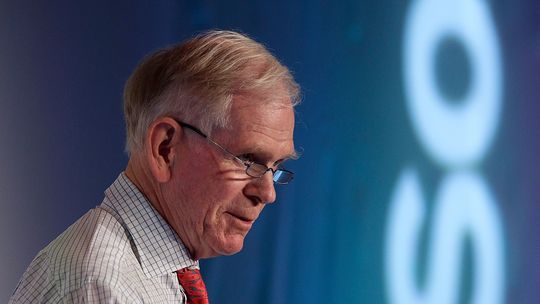Bear-market rallies are a common feature of ‘superbubbles,’ says legendary investor Jeremy Grantham
A “superbubble” appears dangerously near its “final act” after the recent rally in U.S. stocks lured some investors back into the market just ahead of potential “tragedy,” according to Jeremy Grantham, the legendary co-founder of Boston-based investment firm GMO.
Grantham, who has repeatedly warned investors of a bubble in markets, said in a paper Wednesday that “superbubbles are events unlike any others” and share some common features.
“One of those features is the bear-market rally after the initial derating stage of the decline but before the economy has clearly begun to deteriorate, as it always has when superbubbles burst,” said Grantham. “This, in all three previous cases, recovered over half the market’s initial losses, luring unwary investors back just in time for the market to turn down again, only more viciously, and the economy to weaken. This summer’s rally has so far perfectly fit the pattern.”
The U.S. stock market tumbled during the first half of 2022 as investors anticipated soaring inflation would lead to a hawkish Federal Reserve. The S&P 500 closed at a low this year of 3,666.77 on June 16, before surging over the summer along with other stock benchmarks amid investor optimism over signs that the highest inflation in decades was easing.
Fed Chair Jerome Powell recently ended that rally with his Aug. 26 speech at the Jackson Hole, Wyo., economic symposium, wiping out this month’s gains as he reiterated that the central bank would keep tightening its monetary policy to tame soaring inflation. He warned that the Fed would battle inflation until the job was done, even as it may bring pain to households and businesses.
“The U.S. stock market remains very expensive and an increase in inflation like the one this year has always hurt multiples, although more slowly than normal this time,” Grantham said. “But now the fundamentals have also started to deteriorate enormously and surprisingly: Between COVID in China, war in Europe, food and energy crises, record fiscal tightening, and more, the outlook is far grimmer than could have been foreseen in January.”
Grantham had warned in a January paper that the U.S. was approaching the end of a “superbubble” spanning across stocks, bonds, real estate and commodities following massive stimulus during the COVID-19 pandemic.
In his paper Wednesday, Grantham said “the current superbubble features an unprecedentedly dangerous mix of cross-asset overvaluation (with bonds, housing, and stocks all critically overpriced and now rapidly losing momentum), commodity shock, and Fed hawkishness.”
The bursting of superbubbles has multiple stages, according to Grantham.
First the bubble forms and then a “setback” in valuations – such as the one seen in the first half of 2022 – occurs as investors come to realize “perfection” won’t last, he said. “Then there is what we have just seen – the bear-market rally,” before finally “fundamentals deteriorate” and the market drops to a low.
“Bear-market rallies in superbubbles are easier and faster than any other rallies,” he said. “Investors surmise, this stock sold for $100 6 months ago, so now at $50, or $60, or $70, it must be cheap.”
At the intraday peak on Aug. 16, the S&P 500 had made back 58% of its losses since its June low, according to Grantham. That was “eerily similar to these other historic superbubbles.”
For example, “from the November low in 1929 to the April 1930 high, the market rallied 46% — a 55% recovery of the loss from the peak,” he said.
He also highlighted the “speed and scale” of other bear-market rallies.
“In 1973, the summer rally after the initial decline recovered 59% of the S&P 500’s total loss from the high,” he wrote. More recently, in 2000, Grantham wrote that “the Nasdaq (which had been the main event of the tech bubble) recovered 60% of its initial losses in just 2 months.”
U.S. stocks ended lower Wednesday, with all three major benchmarks booking a fourth straight day of declines on the final day of August. The Dow Jones Industrial Average DJIA, +0.46% dropped 0.9%, while the S&P 500 SPX, +0.30% fell 0.8% and the technology-heavy Nasdaq Composite COMP, -0.26% slid 0.6%.
“Economic data inevitably lags major turning points in the economy,” said Grantham. “To make matters worse, at the turn of events like 2000 and 2007, data series like corporate profits and employment can subsequently be massively revised downwards.”
“It is during this lag that the bear-market rally typically occurs,” he said. And now the current superbubble appears to have “paused between the third and final act,” according to Grantham.
“Prepare for an epic finale,” he said. “If history repeats, the play will once again be a Tragedy. We must hope this time for a minor one.”

